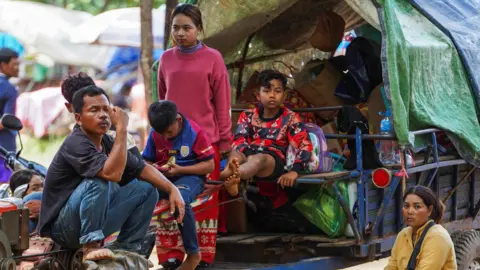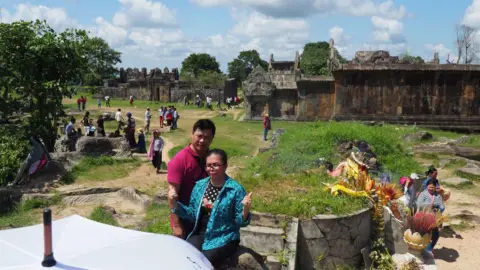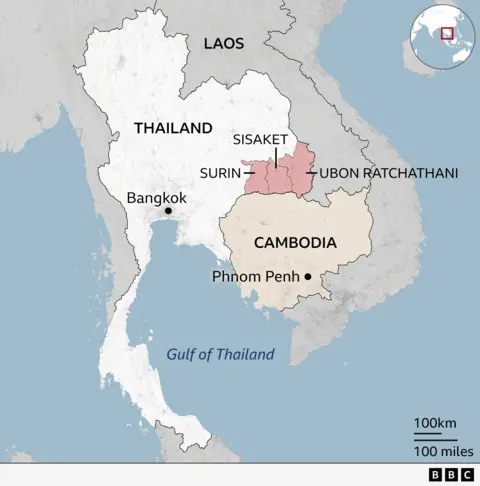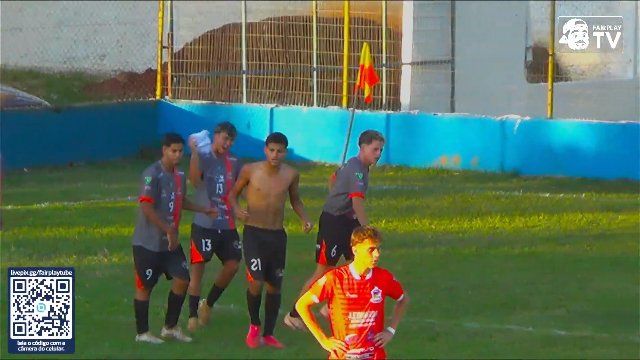BBC News, Singapore
 Reuters
ReutersAs the border clashes this week killed more than a dozen people in Thailand and Cambodia, regional governments have been trying to prevent a war between the two countries.
But a different kind of war between their citizens is already raging – via increasingly belligerent exchanges on social media.
Nationalists from both sides have long bickered over several points of national pride – from ownership of temples and territories to the origins of traditional dances, costumes, food and sports.
The rising tensions in recent weeks, which culminated in the deadly attacks on Thursday, have now prompted young people on both sides to trade fresh barbs online.
The comment sections of social media posts about the conflict have turned into an online warzone, with Thai and Cambodian users arguing with each other and backing their governments official version of events.
“Justice for Cambodia,” one Cambodian user commented on a TikTok video of a user trying to explain the conflict. “Thai troops opened fire on Cambodian forces first.”
“[Who’s] gonna trust [what] the largest scammer country said?” a Thai user replied, making a reference to the widespread scam centres in Cambodia that have entrapped hundreds of thousands.
“Cambodia fired at Thailand first. This is the truth. Join in using the hashtag #CambodiaOpenedFire” a Thai X user wrote, in a post that has been viewed a million times.
Cambodians, meanwhile, are using the hashtag “Thailand opened fire” and making their own videos about the conflict.
 Getty Images
Getty ImagesBorder tensions between the two countries have been simmering since May, after a brief skirmish killed one Cambodian soldier. Both countries imposed travel restrictions on each other and strengthened military presence along the border.
As bilateral ties plunged to their lowest levels in a decade, some voiced concerns about hate-mongering on social media that threatened to divide the two countries’ people even more.
Cambodian and Thai journalists’ associations issued a joint statement in May, saying that social media users have “circulated information without clear sources” and “caused confusion”.
The groups urged social media users to “carefully consider the potential consequences” when sharing content related to the border.
As things heat up, a few have taken the belligerence offline too. A viral video posted on Thursday showed what appeared to be a Thai man asking Cambodian workers to speak Khmer – before slapping one of them in the face.
“We’re now beginning to see violence, even among the groups with no prior conflict between them,” Wilaiwan Jongwilaikasaem, a journalism professor at Thammasat University, told BBC Thai, describing the nationalistic influencers as waging a “war of hate”.

Long cultural rivalry
There are plenty of sensitive touchpoints for social media warriors from both countries to battle over.
The dispute between the two countries dates back to more than 100 years ago, when the borders of the two nations were drawn after the French occupation of Cambodia.
In 2008, Cambodia registered Preah Vihear, an 11th Century temple located near the disputed border as a Unesco World Heritage Site – a move that was met with heated protest from Thailand.
The dispute later expanded to the 13th Century Ta Moan temple complex – which Cambodia claimed Thai troops had lined with barbed wire on Thursday.
These historical sites are at the heart of a longstanding cultural rivalry between the two countries, which also extends to the realms of sports, cuisine and attire.
Thai nationalists decry what they say is cultural theft by “Claimbodia”, while their Khmer counterparts have dubbed them “Siamese thieves”.
In 2023, Thai kickboxers boycotted the Southeast Asian Games in Cambodia after the sporting event they recognised as Muay Thai was introduced as Kun Khmer – which is what Cambodians call it.
Earlier this month, controversy ensued after Cambodia nominated its Khmer wedding tradition for inscription on Unesco’s list of intangible cultural heritage.
Thai social media users claimed that a Thai traditional dress was in the submission – igniting anger and allegations of cultural appropriation, as Thailand was also seeking consideration for its traditional attire to be recognised by Unesco.
More recently, Thai tourists attacked Cambodian military officers at Ta Muen Thom, a temple in a disputed area along Thai-Cambodian border.
Politicians’ war on X
Whether the aggression will wane remains to be seen, now that Cambodia has called for a ceasefire.
On the other hand, the political kingmakers on both sides – who are avid social media users themselves – are hurling jabs at each other too.
In a post on X, Thaksin Shinawatra, Thailand’s populist former prime minister, said he appreciated the offers he had received to help mediate the hostilities.
“But I asked for some time because I have to let the Thai military teach Hun Sen a lesson for his cunningness,” he wrote.
Hun Sen, a strongman ex-leader who remains influential in Cambodian politics, retorted on his X account.
“I am not surprised by Thaksin’s attitude toward me, because he has even betrayed the Thai King, as well as members of his own party,” he wrote on Friday. “Now, under the pretext of taking revenge on Hun Sen, he is resorting to war, the ultimate consequence of which will be the suffering of the people.”
This particular escalation of events was, in fact, caused by the unexpected fracturing of a long-standing friendship between Hun Sen and Thaksin Shinawatra. Hun Sen leaked a phone call between him and Thaksin’s daughter, Paetongtarn Shinawatra.
The conversation, where Paetongtarn – then prime minister – called him “uncle”, and criticised one of her own military commanders, was hugely embarrassing for her and sparked massive public anger.
She has since been suspended as prime minister and Thailand’s Constitutional Court is considering a petition for her dismissal.
Some Thais believe that the leaking of the phone call was an attempt by Hun Sen to distract his people.
“Hun wants dispute and war, he wants to solidify his and his son’s future position in (Cambodia) and he needs to have bigger enemy which is why he push for anti-Thai narrative and war,” said one Thai social media user in response to a Cambodian’s post which said “there is no reason for smaller country with weaker economic (sic) like Cambodia to invade Thailand first”.
Even if the border conflict stops short of being a full-fledged war, the battles on the social media look set to continue.
Additional reporting by Paweena Ninbut





